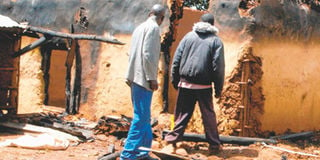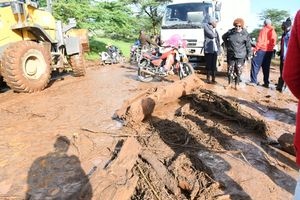Who will stop this madness?

In parts of Kisii, you age at your own peril. What with gangs of young witch hunters administering quick and murderous justice on any senior citizen suspected of witchcraft? The barbarity is reminiscent of the witch-hunts of medieval Europe. Photo/FILE
In October last year, Keyogera village in the Mutunwa sub-location of Kisii was the gory scene of smouldering houses and wailing relatives.
Students from Nyanko Secondary School were on the rampage, torching, among others, the homestead of a 70-year-old woman. Her sin? They claimed she had cast an evil spell on a fellow student who was about to write his exams.
In some parts of Gusiiland, sunset years are a traumatising period. The aged live in the constant nightmare that they could be labelled witches and lynched once the sun dips into the horizon... every day.
Witch hunters pounce on the suspects, usually old men and women, under the cover of darkness. In what is now a gory pattern reminiscent of the medieval stake and its attendant barbarity, they burn the suspects. Blue gum leaves and branches are the favourite fuel.
A cycle of fear reigns. Fear that the witches will readily cast an evil spell over that neighbour they envy — or that promising child who has been topping the class; fear of that violent midnight knock on the door when the witch hunters strike.
In a motley of superstition or harsh reality, depending on where you stand on these matters, the hunter and the hunted are enslaved in fear. Some say fear of the unknown, others say fear of a much known plain evil.
Severe chest pains
The Nyanko students had earlier on torched two houses and seriously injured a man suspected to have colluded with the elderly woman to harm the student.
It was reported that the student, who died moments after the examinations kicked off, complained of blurred vision, severe chest pains and vomited blood. Even the presence of Administration Police officers could not deter the irate students.
Sometimes the line between witch hunting and sheer crime is blurred. Jemima Moseti, 50, was suspected of harbouring witches.
And so, according to her son Josephat Moseti, the witch hunters hatched a plot to punish her. Four days to Christmas last year, they knocked on her door. They said they were policemen, and ransacked the house for chang’aa, which they didn’t find.
Next, they demanded Sh10,000 from her, prompting her to place a call to her son for the cash, which he could raise. “They had told her that failure to raise the money would lead to her death.
“Barely an hour later, my wife called. I could detect the distress in her voice. The three visitors had killed my mother but spared my wife,” he told us.
Screams had pierced the calm of the night, but the shell-shocked villager, knew better than to venture outdoors. According to Mr Moseti, the grudge with the vigilantes started after her mother was accused of harbouring suspected witches.
“My mother died, not because she was a witch, but because she had a soft spot for people she perceived to be under threat from the witch hunters. They warned her that she would be killed for providing them with a hiding place and food” he recalls.
According to Moseti, some witch hunters are also brazen extortionists who spare those who can pay up. Elsewhere, Ms Jemima Kemuma, 76, of Keumbu says that she and other women of her age don’t have a future.
She believes that witchcraft exists, but she can’t understand why the younger generation is targeting old people while anybody can be a witch.
“The boys we helped their mothers deliver, heal and feed have turned against us. This generation is rotten!” she curses.
“Witchcraft is a family thing. It is passed on to someone by his or her parents before they die. Even children as young as 13 can possess the spiritual power of witchcraft,” she explains.
Similarly, she says the fear of witches is passed from parent to child. “If you grew up knowing that so and so was a dangerous person, you would be very careful with them and caution your children against associating with such people”.
Grandmothers have every reason to fear for their lives. On the night of September 13 last year, in Nyangoso village, Nyamira, young villagers battered and eventually burnt two elderly women on allegation that they were responsible for the death of several villagers.
“The grandmothers pleaded for the villagers to prove their allegations before killing them, but the young men had made up their minds,” recalls Anna Bosire. She says there is no stopping the villagers once they target someone.
“You can easily be the next victim if you try to rescue whoever they want to kill. The best thing to do at such a time is to watch and wait to bury the person. Not even the children can rescue their mother.”
It happened two years ago in a place called Kegogi Mtembe, Nyakeyo. A list of 17 suspected witches was produced in a kangaroo court, where the accusers were the prosecutors, the judges and the jury. That night, four people were lynched, but quick action by the police saved the rest.
And it gets more bizarre. Last week villagers told us that those who were behind the killings also died because the witches were hitting back. Here, witchcraft is not taken for granted.
“When someone finds out that someone else’s children are performing better in school than his, they mostly choose to bewitch them,” believes Kennedy Onguso, 23.
And George Moseti, 27, says there are different forms of witchcraft. Because nobody has so far, he tells us, attempted to harm him. The two men believe witchcraft can be warded off using black jack spikes and oil extracted from pork.
“When a child is born, the seeds of black jack are sewn on his vest and, every time he is supposed to be taken outside the house, oil from pigs is smeared on his face and lips to make him resistant to any kind of evil spell,” they said.
None of the two could explain how the protection worked, and Pastor Evans Ochengo of SDA Church trashes the safety measures as unreal. “If you believe something can protect you, it will. But we want these people to believe in the power of religion rather than conquering evil with worldly belief,” he says.
Fellow man of cloth Pastor Henry Nyamwanda, of the Seventh Day Adventist Nyamira Conference, says it does not make any sense for people to wait for someone to turn 80 and then kill her on the ground that she is a witch.
“It is true that witchcraft exists, even in the Bible it is associated with the evil,” says the pastor. “But I have never had someone come to my church and confess that he or she is a witch, which makes it difficult for me to prove that witches exist here”.
Very careful
However, he advises pastors to be very careful “in this part of the world” when dealing with witchcraft. “We have had cases where a pastor tells someone that they had been bewitched by someone, only for that suspect to be lynched”.
Anglican church Bishop Joseph Otieno Wasonga concurs that, as long as there is belief in God and Evil, witchcraft exists.
“Just as there are positive powers, there are negative powers, which are referred to as magic, but most times they are mainly psychological,” he says.
Maseno University lecturer Dr Carey Onyango says witchcraft is just but a mindset that there are supernatural powers that can be remotely controlled to affect lives.
“There is no scientific and logical basis that, if someone stares at you, for example, you can die. “But we live in a world where people believe in supernatural powers, hence the reverence of things such as horoscopes. You cannot really take it away from them”.
To him, the lynching of witches is an act of lawlessness that must be contained by the government. A senior advocate based in Kisumu says that, although there are provisions criminalising the practice of witchcraft in law, it is a very amorphous subject that is usually very difficult to prove, hence not many of those accused can stand before the courts of law.




